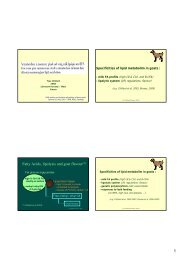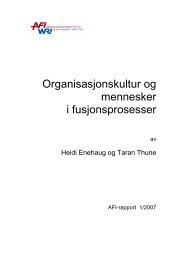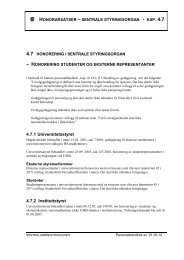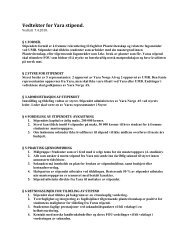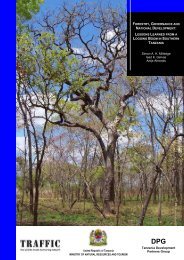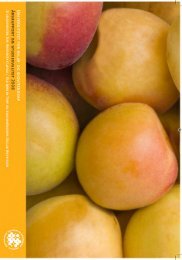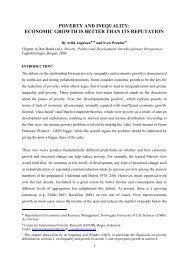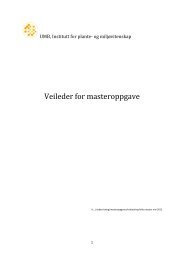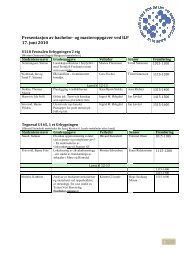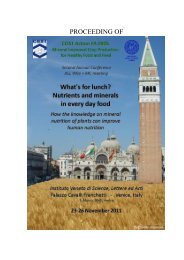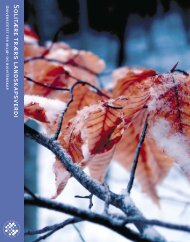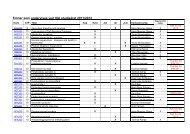Sustaining Livelihoods through Organic Agriculture in Tanzania - UMB
Sustaining Livelihoods through Organic Agriculture in Tanzania - UMB
Sustaining Livelihoods through Organic Agriculture in Tanzania - UMB
Create successful ePaper yourself
Turn your PDF publications into a flip-book with our unique Google optimized e-Paper software.
technology’. This is appropriate to the study of organic systems <strong>in</strong> which <strong>in</strong>formation<br />
and farmers understand<strong>in</strong>g are critical production <strong>in</strong>puts.<br />
FSR and Extension and its many variations typically <strong>in</strong>volve 'highly site-specific<br />
evaluations of possible solutions to well-identified limitations <strong>in</strong> the local production<br />
system' (Lockeretz & Stopes, 2005: 1). Often FSR <strong>in</strong>volves 'on-farm research with a<br />
farm<strong>in</strong>g systems perspective' (Remenyi, 1987: 17) lead<strong>in</strong>g to the generation of<br />
qualitative data requir<strong>in</strong>g <strong>in</strong>terpretative analysis. The advantages of carry<strong>in</strong>g out<br />
research on work<strong>in</strong>g farms are that the research can be conducted under a wide range<br />
of grow<strong>in</strong>g conditions, the research can benefit from farmers' expert knowledge of a<br />
farm<strong>in</strong>g system and also allow farmers' management ability and preferences to be part<br />
of what is studied, foster<strong>in</strong>g farmer-to-farmer exchange of <strong>in</strong>formation, to allow<br />
farmers to have a greater role <strong>in</strong> choos<strong>in</strong>g research topics.<br />
It is thought that more organic research is conducted on work<strong>in</strong>g farms than<br />
conventionally oriented research (Lockeretz & Stopes, 2005). This is because organic<br />
systems are usually considered to be more closely l<strong>in</strong>ked to conditions on a specific<br />
site. Furthermore, whole-farm studies are especially applicable to research <strong>in</strong>to<br />
organic farm<strong>in</strong>g s<strong>in</strong>ce an important concept <strong>in</strong> organic farm<strong>in</strong>g is for the entire farm to<br />
be managed as a coherent system.<br />
The primary objective of FSR is ‘to improve the wellbe<strong>in</strong>g of <strong>in</strong>dividual farm<strong>in</strong>g<br />
families by <strong>in</strong>creas<strong>in</strong>g the productivity of their farm<strong>in</strong>g systems, given the constra<strong>in</strong>ts<br />
imposed by resources and the environment’ (Remenyi, 1987: 17), and this co<strong>in</strong>cides<br />
with one of the ma<strong>in</strong> goals of this research – to improve the design of organic<br />
agricultural <strong>in</strong>terventions so that they br<strong>in</strong>g significant benefits to smallholder<br />
farmers. Conceptually FSR approach recognises the vital connection between<br />
technologies and policy support systems, and thus an important thrust of such<br />
research is the implementation of appropriate policies and support systems to create<br />
opportunities for improved production systems. Aga<strong>in</strong> this perspective is deemed<br />
useful <strong>in</strong> help<strong>in</strong>g to provide conditions conducive to the adoption of organic<br />
technologies <strong>in</strong> <strong>Tanzania</strong>.<br />
3.5 Case Study Research<br />
Case studies have been def<strong>in</strong>ed as ‘studies of events with<strong>in</strong> their real-life context’<br />
(Y<strong>in</strong>, 2003: 72). Reta<strong>in</strong><strong>in</strong>g the holistic and mean<strong>in</strong>gful characteristics of real-life<br />
events is particularly advantageous ‘when the relevant theory underly<strong>in</strong>g the case<br />
study is of a holistic nature’ (Y<strong>in</strong>, 2003: 45) as is the case <strong>in</strong> organic agriculture.<br />
Case studies can act as "w<strong>in</strong>dows" on organic agriculture <strong>in</strong> a particular region or<br />
context. Case Study Research (CSR) is preferred ‘when “how” and “why” questions<br />
are be<strong>in</strong>g posed, when the <strong>in</strong>vestigator has little control over events, and when the<br />
focus is on a contemporary phenomenon with<strong>in</strong> some real-life context’ (Y<strong>in</strong>, 2003: 1).<br />
In the context of this study, CSR was adopted as a way to <strong>in</strong>vestigate the causes and<br />
criteria for “success” <strong>in</strong> organic agriculture at the project level. Dur<strong>in</strong>g CSR,<br />
therefore, ‘researchers collect detailed <strong>in</strong>formation us<strong>in</strong>g a variety of data collection<br />
procedures over a susta<strong>in</strong>ed period of time’ (Creswell, 2003: 15).<br />
20



